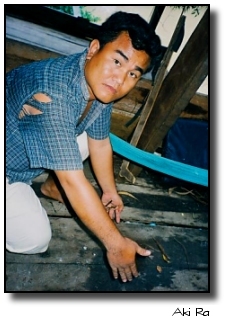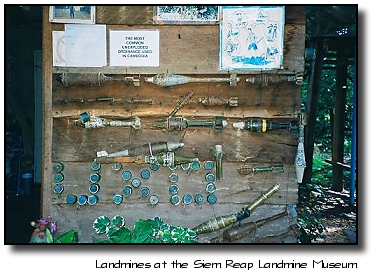Aki Ra and Landmine Museum
by Antonio Graceffo
 The crossbow was a deadly weapon, which fired a one-meter long steel arrow.
The crossbow was a deadly weapon, which fired a one-meter long steel arrow.
"I use this one to hunt wild boar," Explained Aki Ra, the proprietor of the Landmine Museum of Siem Reap. "I need the meat to feed my family. After all, I have twenty sons."
The "sons" Aki Ra was talking about were formerly street children, many landmine victims, who he has taken to live with him at his center. The Landmine Museum in Siem Reap looks like a jungle camp, a collection of wooden shacks surrounding a common area at the top of an embankment leading down to the river. Almost every vertical and horizontal space is covered with landmines and other explosive ordnance.
"All the mines here are safe." He assured me.
The museum, like its creator, Aki Ra, serves a variety of roles. First, it is home to some of the most desperate street children and war orphans in Siem Reap.
"I only take the worst kids." Laughs Aki Ra. "The ones on glue or yaba (methyl amphetamine), with no families. They get caught stealing. They have trouble with the authorities. The police beat them. Some of them were living in the streets, begging."
Aki Ra takes the children in, feeds them, and sends them to school. This is no easy task for Aki Ra who, at age thirty, has his own wife and children to care for. And so, he supplements his family's diet by hunting and trapping.
"Now, many children want to come here. But I can't help them all. I take the hopeless ones, because I want to turn them into good people." Aki Ra has had great success in converting the street children. "Before, they were in trouble. Now, they love to go to school. Some kids change faster than others." He told me.
Aki Ra was a slightly built man with a baby face and nearly flawless English. The compassion that he had for the children he cared for was evident in both his speech and his manner. His compassion is even more amazing when you analyze the details of his live. Aki Ra was practically born in the Khmer Rouge. The KR killed his parents, and he was raised in the jungle in a Khmer Rouge children's unit. When he was ten years old, he ran away to the Thai border. Later, he joined the Vietnamese army in Cambodia.
 He had never had a family, or an education, or a childhood. For much of his life, all he knew was war. Under the same circumstances, another man may have been bitter. He may have dedicated himself to revenge or a life of crime and violence. Instead, Aki Ra has taken the lessons that he learned during his years of hardship and applied them to helping the Khmer people.
He had never had a family, or an education, or a childhood. For much of his life, all he knew was war. Under the same circumstances, another man may have been bitter. He may have dedicated himself to revenge or a life of crime and violence. Instead, Aki Ra has taken the lessons that he learned during his years of hardship and applied them to helping the Khmer people.
Alone, and using only a knife and a wooden stick, Aki Ra goes out into the jungle and disarms mines. As a soldier he learned a lot about mines by planting them. Now, he uses this knowledge and experience to save lives.
"I poke my stick in the ground till I find a mine." He said. "Then I dig around it, to make sure that it is not booby-trapped. Then, I unscrew the detonator. And the mine is safe."
The villagers around Siem Reap know and trust Aki Ra. They come to him when they discover a landmine. It is still somewhat common in Cambodia that a Sheppard will be killed when one of the buffalo he is tending steps on a mine.
"They called me out to village the other day." Began Aki Ra. "Where they had found one mine. I dug all around, and found ten."
Aki Ra disarmed all of them in one day.
"I screw out the detonators and put them in my pocket. By the end of the day, my pockets are full."
To dispose of the detonators, Aki Ra builds a fire and tosses them in. "It sounds like fireworks." He told me, with a laugh. As for the TNT, the explosive component of the mine, it requires both heat and pressure to detonate. So, Aki Ra builds a second fire and burns the TNT. "It doesn't explode." He explained.
Aki Ra is like a one man NGO, risking his life to help the Khmer people. But, where does the hunting and trapping come in? He spends weeks in the jungle on his de-mining missions. While he is out there, he sets traps, and checks them daily. Whatever he catches goes into the bellies of his hungry children. Trapping and killing animals was one more skill he acquired in the Khmer Rouge. As a veteran of the US military, I know that American soldiers take it for granted that they will get re-supplied by helicopter on some regular basis, and that they will be rotated out of a combat zone periodically. But Khmer Rouge soldiers had no such luxury.
"We would get hungry, and the only way to get food was to hunt." Explained Aki Ra. "If we hunted with weapons the enemy would hear us." And so, to stay alive, they learned to hunt with crossbows, and use traps to catch their food.
Aki Ra stressed that he wanted his children to learn English as he had. He welcomed visitors to his center and was eager to allow volunteers to stay on as long as they liked. "Sometimes volunteers spend a few weeks here, and teach English classes to the children." He explained.
In 1991 and 1992 Aki Ra worked for the UN doing mine clearance. In 1997, he came here and started his camp. Soon after, he began doing free de-mining for the villagers.
"I work fast and cheap." Said Aki Ra. "I only need about two minutes, once I find a mine, to unscrew the detonator and make it safe."
"Two minutes! And, it doesn't cost anything." He said proudly. Aki Ra said that he was grateful for CMAC, HALO, and any other organizations that were de-mining in Cambodia. But, he felt that they worked too slowly and wasted too much money.
"They have insurance, rules, and procedures." He explained. "They are big organizations, so a lot of money is spent on offices and administration."
According to Aki Ra, once a metal detector goes off, there is a very long and costly procedure, and there are many false alarms. "Sometimes there are a lot of fragments in the ground, and they set off the metal detector. It takes hours to follow the procedure. They have to dig up the earth. They evacuate the area and blow the mines in place. Which creates more fragments, making it more difficult and time consuming to find the next mine."
"Some mines you discover are broken, and can't go off. But they still take all day to blow in place. When I find something, I dig all around and check. If I see no fuse and no TNT, I throw it away. And it doesn't cost any money. For the NGOs to remove one mine they need 200 to 400 gm of TNT and fuse. It is very expensive."
Aki Ra estimated that it costs them about $500 -$800 to do one mine. "They only work five days a week. They get the same salary if they find one, one hundred, or zero mines. They have holidays... But it is better than nothing." He repeated.
In Cambodia, in general, there has been a lot of discussion related to the inefficiency of high-paid foreign experts. The average Khmer only earns $26 per months. Khmers with university degrees, and good jobs with NGOs are pleased to earn $250 a month. Six hundred to one thousand dollars a month is almost unheard of for a Khmer. But many foreign experts in Cambodia earn between $2,000 and $4,000 a month. Some earn as much as $8,000 - $10,000 per month, and the higher the salary, they higher the allowances such as free transportation and housing. Said another way, some NGO personnel earn in one month, what a Khmer earns in a lifetime.
Aki Ra works for free, solely out of concern for his people.
I had heard through the NGO community that Aki Ra had recently come into some trouble with the government.
"Yes, they said that since I have no license, I couldn't work as a de-miner."
I asked why this was.
"They worry about terrorism." He explained. "After you dig up the mine and disarm it, what will you do with the detonators and explosives? They don't want people stockpiling that stuff because it would be too dangerous."
"So, now I de-mine in secret." He said, with a sly grin.
You had to define secret. Aki Ra is one of the more interviewed characters in modern Cambodia. In fact, I was lucky to catch him, as he was on his way to speak at a big UN conference about mines.
"I have applied for a de-mining license, but it hasn't come in yet. Very slow, very slow," he said, sadly. "There are still over one million landmines in Cambodia. At the rate they are going now, it will take 50-100 years to finish. If they give me a license then I could teach villagers to de-mine the way I do. It is fast, easy, and cheap. I believe we could have the whole country de-mined in 3-5 years."
For a country, which often seems hopeless, Aki Ra was a man full of vision, and plans for the future.
"My dream," said Aki Ra, "is to have a big camp, where I could help more people. I would have a school and a larger landmine museum. Everyone wants to help children. But I also want to help the elderly. There are a lot of old people in Cambodia who lost their whole family in the war. They are a little crazy, and live on the street. I want to build a big farm and a hospital. I want to create a new village to help these old people."
Aki Ra's Landmine Museum is a small version of his utopian dream, a world which held a place for everyone, old, young, disenfranchised or disabled, a world where people helped and cared for one another, and most of all, a world devoid of landmines.
Is that too much to ask?
Contact the author at: antonio_graceffo@hotmail.com
You can reach Long Leng of Phnom Penh Tours at ppenhtourism@camnet.com.kh
You can contact Aki Ra at akiramineaction@gmail.com
Antonio Graceffo's books are available at amazon.com